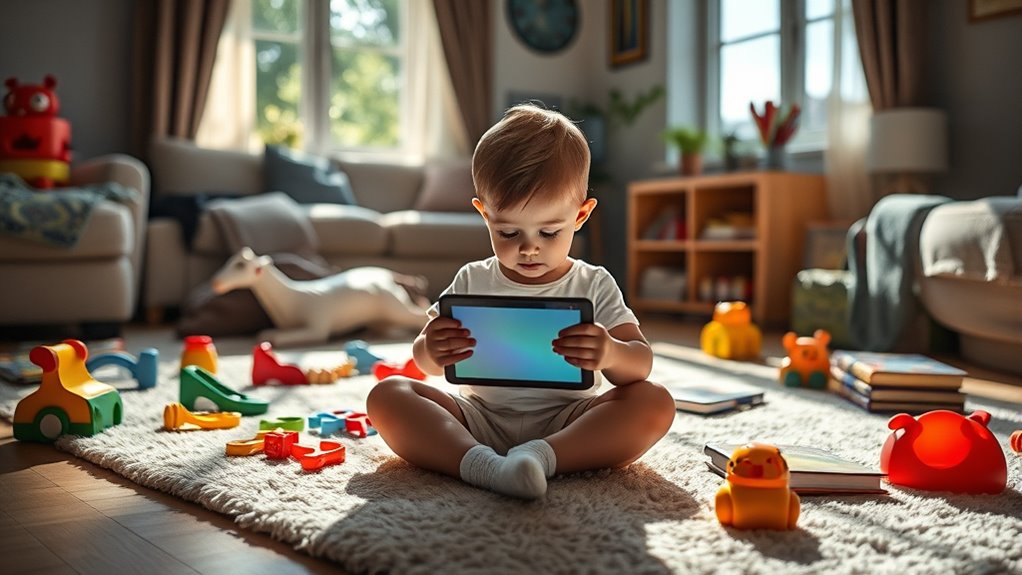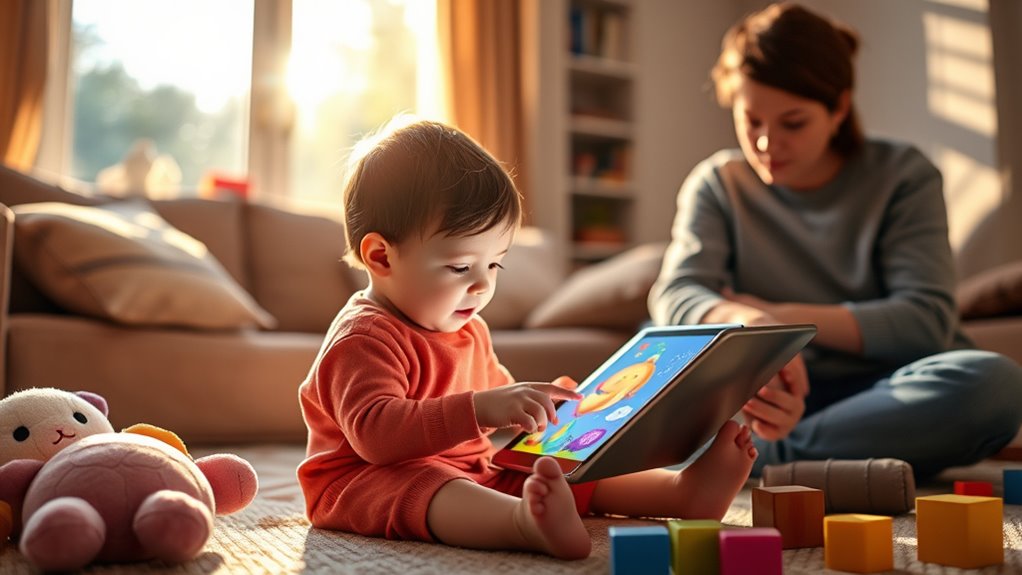Balancing screen time and active play for toddlers is essential for their growth. Stick to guidelines: avoid screens under 18 months, limit to one hour of high-quality content for ages 2-5, and engage with them during viewing. Too much screen time can lead to language delays and reduced social skills. Encourage active play to boost cognitive and emotional development, helping them learn crucial skills. There’s more to discover about optimizing their screen time and play habits ahead.
Key Takeaways
- Limit screen time for toddlers to one hour of high-quality programming, prioritizing interactive and educational content.
- Encourage co-viewing and discussions to enhance understanding and connection during screen time.
- Promote active play as a primary activity, fostering physical health, social skills, and cognitive development.
- Establish clear rules and schedules for screen time, ensuring consistency and understanding for toddlers.
- Model healthy screen habits and engage in open conversations about technology use and its impact.
Understanding Screen Time Guidelines for Toddlers

How do you navigate the screen time guidelines for toddlers? Start by understanding age-based recommendations.
For infants under 18 months, avoid all screen time except for video chatting.
When your toddler is between 18-24 months, you can introduce high-quality educational media, but make sure to engage with them. Engaging with your toddler during screen time can enhance their cognitive development and help them make connections to the real world.
For toddlers aged 2-5 years, limit screen time to just one hour a day of high-quality programming. Focus on content that promotes learning and includes your involvement.
Opt for interactive apps that encourage engagement, and always choose age-appropriate media.
Remember, co-viewing and discussing what you watch together enhances their understanding.
Co-viewing and discussing media together fosters deeper understanding and connection for your child.
Setting limits and modeling healthy screen behaviors is vital for maintaining a balanced lifestyle for your little one. Additionally, incorporating active lifestyles can further support their overall development and well-being.
The Impact of Excessive Screen Time on Development

While adhering to screen time guidelines is important, it’s equally essential to recognize the potential consequences of excessive screen exposure on your toddler’s development.
Heavy screen use can lead to language delays, as background TV interferes with language acquisition. You might notice attention difficulties and lower cognitive skills, especially if screens replace hands-on activities. Additionally, understanding cognitive development is crucial for fostering healthy learning environments, as it helps parents identify when emotional coping strategies are necessary for their child’s growth. Engaging in active play promotes cognitive skills and helps counteract the negative impacts of screen time. Encouraging physical activity is vital to support overall health and development.
Social-emotional growth can also suffer; toddlers may struggle with emotional regulation and social cues due to reduced face-to-face interactions. Furthermore, excessive screen time correlates with increased risks of anxiety and depression, which can hinder their ability to develop healthy relationships with peers.
Physical health isn’t spared either, as it can contribute to obesity and disrupted sleep patterns. Balancing screen time with active play is vital for your child’s overall well-being and development. Additionally, permanent hearing loss can be a concern if auditory exposure is not managed properly in environments with high screen volume levels.
Prioritizing Quality Over Quantity in Screen Content

As you navigate screen time for your toddler, prioritizing quality content is vital for their development. High-quality educational programming can greatly enhance language and literacy skills. Incorporating interactive educational toys can further complement the learning experience from screen time. Fresh and nutritious foods, including organic juices, provide essential vitamins that support cognitive function. Additionally, maintaining a balanced diet with juice cleansing can help promote overall wellness and boost hydration.
Look for interactive apps and shows that promote active engagement, as these are more effective than passive viewing. Opt for slow-paced content, allowing your child to process information better. Additionally, consider the importance of freshly squeezed juices in your child’s diet, as proper nutrition supports their overall well-being.
It’s important to choose age-appropriate media that aligns with their developmental stage. Co-viewing with your toddler not only fosters understanding but also helps apply screen content to real life.
Focus on engagement over mere consumption, steering clear of distracting or violent content. By selecting enriching, interactive experiences, you support your child’s cognitive, emotional, and social growth through technology. Additionally, be aware that excessive screen time can lead to reduced attention span, which may hinder your child’s overall development.
Strategies for Managing Screen Time Effectively

Effective management of screen time for toddlers requires a thoughtful approach that balances structure and flexibility. Start by setting clear, age-specific rules that your child can easily understand. Involve them in creating these rules to foster cooperation.
Establish a daily schedule with designated screen time, clearly communicating shifts to other activities to minimize confusion. When resistance arises, acknowledge your child’s feelings while maintaining firm boundaries. Offer alternatives post-screen time to redirect their focus. Socialization critical for healthy development helps toddlers learn how to interact with their peers and manage their emotions. Additionally, consistency in routines can enhance your child’s adaptability to these screen time limits. Engaging in community support resources can provide both you and your child with valuable insights and encouragement during this learning process. Creativity can be cultivated by anyone through various activities, which can serve as engaging alternatives to screen time.
Utilize monitoring tools to track usage and reinforce agreed-upon limits. Remember, modeling healthy screen habits yourself is essential; limit your own screen time during family interactions. Open discussions about screen time help nurture balanced tech habits in your toddler. Additionally, consider incorporating pet therapy benefits into playtime, as interaction with animals can enhance emotional well-being and social skills.
Encouraging Active Play and Social Interaction

Active play is essential for toddlers, not just for their physical health but also for their social and emotional development. By encouraging your child to engage in active play, you strengthen their muscles, improve coordination, and support cardiovascular health. Additionally, engaging in active play activities like running or jumping can help toddlers develop their motor skills, just as energy-draining activities can be mitigated by focusing on active play, which helps toddlers maintain a balanced and healthy lifestyle. Incorporating primitive weapons into play can also promote creativity and adaptability in resource-scarce environments.
Moreover, providing opportunities for newborn sunscreens can help protect their delicate skin if they play outdoors, ensuring they can enjoy the sun safely.
Through group activities, they learn teamwork, communication, and empathy, building essential social skills. Interactive play fosters friendships and a sense of belonging, while also teaching important values like sharing and taking turns. Moreover, active play boosts cognitive skills, enhancing focus and problem-solving abilities. It also provides an emotional outlet, helping your child manage stress and build resilience. Furthermore, fostering a growth mindset during play can help children embrace challenges and learn from their experiences.
Frequently Asked Questions
How Does Screen Time Affect Sleep Patterns in Toddlers?
Screen time considerably affects your toddler’s sleep patterns. Increased exposure to screens can delay bedtimes and shorten sleep duration.
The blue light emitted disrupts melatonin production, making it harder for them to feel sleepy. Additionally, interactive content can heighten alertness, leading to longer times to fall asleep.
To improve sleep quality, limit screen time, especially before bed, and encourage calming activities instead, ensuring a restful environment for your little one.
Are There Specific Apps Recommended for Toddlers?
If you’re looking for specific apps for toddlers, consider Khan Academy Kids for a range of educational games, or Sesame Street Alphabet Kitchen to boost literacy skills.
Monkey Preschool Lunchbox teaches essential matching and counting, while Starfall ABCs focuses on phonics.
For interactive fun, try Play PBS Kids or Fish School, which engage toddlers with lively animations and characters.
These apps provide a balance of learning and play that can benefit your child’s development.
What Are Signs of Screen Addiction in Young Children?
Imagine your child’s mind as a sponge, soaking up everything around them. When screen addiction creeps in, you might notice signs like losing interest in favorite activities, mood swings when screens are limited, or a growing need for more screen time.
They may also neglect homework or personal care, preferring virtual interactions over real-life connections. If you see these behaviors, it’s time to step in and set healthier boundaries for their well-being.
Can Screen Time Be Beneficial for Toddlers’ Social Skills?
Yes, screen time can be beneficial for toddlers’ social skills when used wisely. Interactive activities, like video calls or educational apps, can enhance communication and teamwork.
However, it’s vital you engage with them during these activities to maximize the benefits. Balancing screen time with traditional play is key, as unstructured play fosters direct interaction and essential life skills.
Set limits and choose high-quality content to support their social development effectively.
How Can Parents Reduce Their Own Screen Time?
To reduce your own screen time, start by tracking your usage with apps that highlight patterns.
Set daily limits to keep yourself accountable.
Create screen-free zones in your home, like the bedroom or dining area, to encourage unplugged time.
Engage in non-digital activities, such as reading or board games.
Finally, communicate your goals with family and friends, fostering a support system that helps you stick to your screen time reduction plan.
Conclusion
In balancing screen time and play for toddlers, it’s essential to prioritize quality content and encourage active engagement. By setting clear limits and fostering social interactions, you can help nurture your child’s development. Remember, isn’t it more beneficial to create lasting memories through play than to let screens dominate their early years? With thoughtful management, you can guarantee technology enhances rather than replaces precious moments of growth and connection.









